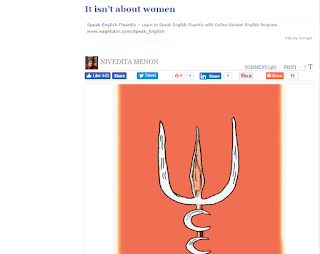UNIFORM CIVIL CODE IS NOT ABOUT HINDU DOMINANCE
In the morning I
came across a column written against uniform civil code in the editorial page
of ‘The Hindu’. The essay was written by Nivedita Menon. She is a professor at
JNU, New Delhi and describes herself as a feminist scholar.
In her column
titled ‘It isn’t about the woman’, she gave reasons to support the continuation of
Sharia based Muslim personal law in India and argued against prohibiting
polygamy and triple talaq. She described the Uniform Civil Code as a Hindu agenda to
impose Hindu laws on Muslims.
I could resist
myself and scribbled a few lines to critique her arguments. It is important to
critically examine her grotesque narrative on the issue. She is denying
democratic space available to Muslim women in secular democracies like India.
According to her even in secular democracies if Muslims women need any right,
they should find it within the Islamic faith.
Recently a Muslim
woman Shayara Bano received talaq by post. Her lawyer, Nivedita Menon grudges,
instead of using any of the other recourses available in the protection of distressed women decided to file public interest litigation (PIL) in Supreme Court of India.
Why should not a hapless
woman use all possible methods to get justice? Why she should seek rights and
justice within limits drawn by Islam? India is not a Taliban. It is a secular republic. This country needs a uniform civil code for
all its citizens. It is not fair to create different laws for different religions.
These separate personnel
laws must not be allowed to exist in India. They are based on religion and deny
gender equality and refuse to accept the common sense of the 21st
century. Uniform civil code should not become Hindu vs. Muslim debate. Laws regulating
the lives of citizens should be based on enlightened modern values ensuring
justice, equality and liberty.
Professor Nivedita
Menon writes, “Polygamy is not exclusive to Muslims. Hindu men are polygamous
too except that because polygamy is legally banned in Hindu law, subsequent
wives have no legal standing and no protection under the law.”
In a strange
twist of logic she is describing how Sharia laws are bringing the positive
changes in the lives of women. Basically, she is suggesting that men are going
to have multiple wives in India irrespective of what law says on the issue. It is
better to have Sharia law than a universal secular law to help and support multiple wives.
She does not stop
here, after this she throws a bigger stone on the common sense of people
reading her article. Under the Sharia law, on the contrary, subsequent wives
have rights and husbands have the obligation.” Allowing men to have four fives is
not allowed even in moderate Muslims nations. It would be considered highly
regressive to even indirectly support such social evils.
Prof. Menon also adopts
diversionary tactics. She tried to argue that it is not even an issue. We should
rather talk about how to protect wives in the patriarchal institution of
marriage. At another instance, she also dismissed the possibility of creating a uniform civil code by borrowing all good principles from all the personnel
laws.
I don’t have time
and energy to underline the big holes in all her arguments in every second
paragraph of her essay. She was desperate to somehow prove that demand for
uniform civil code in India is the agenda of Hindu fundamentalists. She converted
the out of context question posed by a reporter in some television channel into
the symbol of Hindu designs against Islam and Muslims.
A reporter asked
Shayaro Bano, whose lawyer filed the PIL in Supreme Court, what she thinks
about ‘Bharat Mata Ki Jay’ slogan controversy. Mrs Bano replied, “I feel all
Muslims should say it”.
Prof. Menon says
this alone should alert us to what the demand for the uniform civil code is all
about. Perhaps she was suggesting that Mrs Bano’s remark about the slogan
should be interpreted as her acceptance of the dominance of the Hindu community over
Muslims.
This style of
argumentation is highly problematic. Indirectly she is empowering the Muslim
fundamentalists who will prefer to implement the religious laws which are out
of sync with the realities of the contemporary social values. Even though the title of her essay 'it is not about women', she is suggesting that if you are supporting uniform civil code you are having motives other than achieving gender equality.
This the debate is not about Hindu, Muslim and Christians. This is all about making
India a better place and attempt to run away from absurd, irrational and cruel
customary practices.
It is difficult
to support the continuation of personals laws because it has religious sanction in
democratic societies. That’s why Islamic scholars are trying to hide behind
dense legal language and trying to create a discourse, where any demand for
Uniform Civil Code is being projected as Hindu design against Muslims.
For progress
religion must be kept as a personal affair. It cannot be the basis of any laws.
end.




Comments
Post a Comment